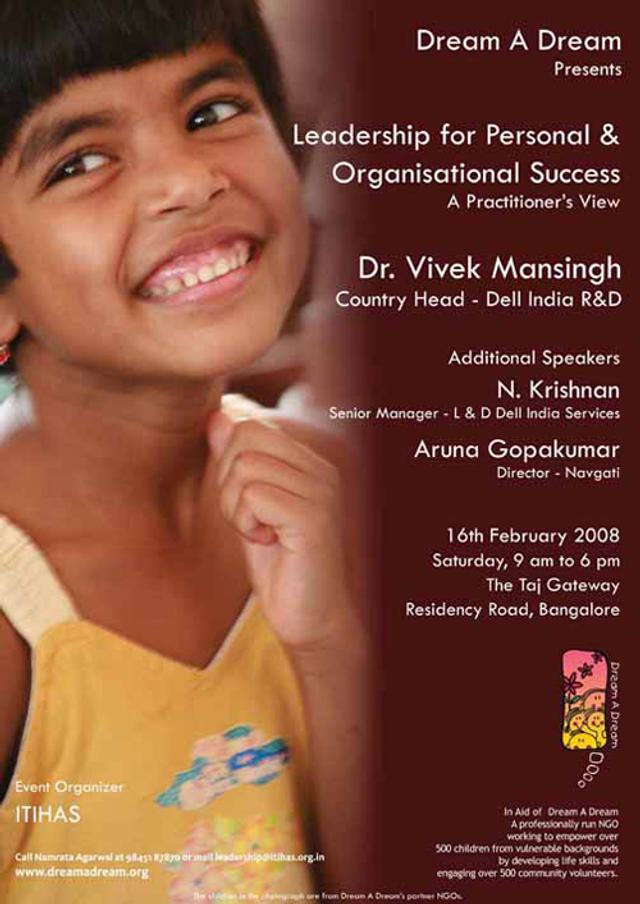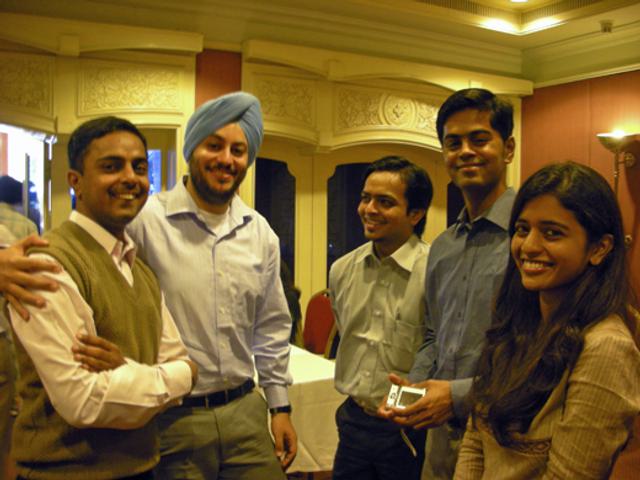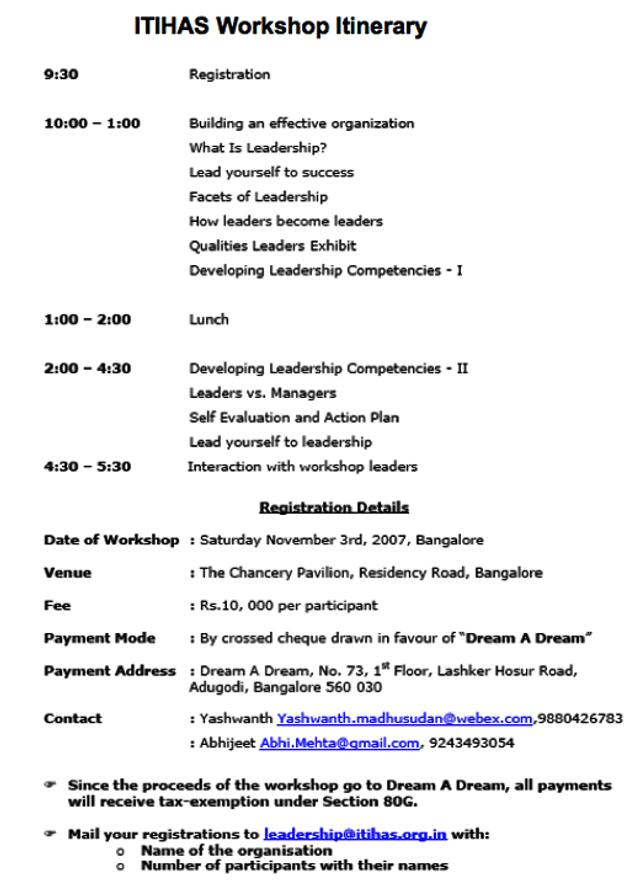ITIHAS (I Think I Have a Solution) leadership workshop
- Exhibited by
- Sattva.
- Added
- June 06, 2011
- Medium of Communication
- Event, face to face
- Target Audience
- Intermediaries
- Type of Charity
- Social change
- Country of Origin
- India
- Date of first appearance
- 2006
SOFII’s view
Isn’t ITIHAS – I think I have a solution – a great name for an innovative organisation that supports non-profits?
If you want to find new angles on fundraising, SOFII has long been an advocate of keeping a close eye on what’s happening in India. Few things will have more impact on improving the effectiveness of voluntary organisations than leadership development. To appreciate the useful outcomes from this idea, see the impact summary, below.
Creator / originator
I Think I Have A Solution (ITIHAS).
Summary / objectives
I Think I Have A Solution (ITIHAS) is a registered trust that was started in 2006 to provide strategic assistance to organisations working in the social sector. The purpose of ITIHAS is to accelerate social change by helping nonprofit organisations to plan core functions and programme implementation at the grassroots level.
ITIHAS organised a leadership workshop in 2006 as a fundraising activity in aid of Dream A Dream, a professional NGO working to empower children from vulnerable backgrounds (see related pages, below, for associated Dream A Dream exhibits). The leadership workshop was a daylong event focused on key decision makers from leading multinational corporations in Bangalore.
The workshop aimed not only to groom key decision makers to become inspiring leaders, but also to raise funds for a charitable organisation as all proceeds went to a nonprofit.
Background
The first leadership workshop was on 24 June 2006 and was attended by decision-makers from organisations such as Texas Instruments, Ernst and Young, Oracle, EMC and IBM.
The workshop was led by Dr. Vivek Mansingh, who serves as Country Head for Dell R & D Center in Bangalore. Before joining Dell, Dr. Mansingh founded and worked for many leading organisations in the United States of America and India. Throughout the workshop, Dr. Mansingh shared insights from his own illustrious career to highlight key points.
Apart from the fee paid by the attendees, ITIHAS created fundraising opportunities around the event. Sponsorship packages of varying levels (premium, gold, silver) allowed the sponsors to advertise in print and email campaigns and have visible presence in collaterals, such as banners and brochures. Sponsors could also set up promotional stalls at the venue for displaying their products and services. Potential sponsors could also buy advertising space in the workshop’s brochure.
Special characteristics
While fundraising events in the aid of NGOs are an accepted practice, the leadership workshop was different because it was positioned as a unique opportunity to promote leadership skills and social values and by the target audience it attracted. It provided a networking platform for mid to senior level managers and also gave them an opportunity to contribute to a socially relevant cause.
By inviting a recognised and experienced business leader, the workshop proved to be a wonderful learning experience for the senior executives. It also gave an organisation like Dream A Dream an opportunity to show its activities to key decision makers in leading organisations and create relationships for working together in the future.
The association of Dream a Dream with themes such as leadership, personal values and execution had a positive influence on the attendees. It set Dream A Dream apart in terms of innovative and successful fundraising strategies.
Influence / impact
- Due to the success of the first workshop, another was held in 2007 in a similar format. In the second workshop, ITIHAS also invited another NGO, Akshaya Patra, to present their work to the participants. In return, the NGO promoted the workshop within their wide corporate network. There were more than 70 to 80 participants at each event.
- Dream A Dream got an opportunity to showcase their work to potential decision makers from diverse companies and to raise money through the participation fee. Two workshops helped Dream A Dream to raise over rupees 1 million.
- Corporate India got an opportunity to send their managers to a high quality workshop facilitated by an experienced and successful leadership practitioner and at the same time to contribute to a good cause.
- Participants got a high quality workshop and also became more aware and sensitive about the cause of vulnerable children.
- The facilitator/speaker got an opportunity to share his skills and experience and also to help the children.
- ITIHAS got an opportunity to bring together all these partners and design and implement a very successful and unique winning fundraising idea.
- Akshayapatra, the NGO featured in the second workshop, got an opportunity to show its activities to the participants. In return, they helped to promote the workshop to other corporations in their network.
Costs
ITIHAS gave their services as presenters and event managers pro bono to both workshops. Each workshop had about 6 volunteers actively supporting and it took 8-10 weeks of effort to organise each workshop. The cost of each workshop averages to about Rs.120000 (US$2,500). MINT, a financial newspaper run in collaboration with the Wall Street Journal in India, gave two quarter-page ads pro bono.
Results
Due to the overwhelming response, the leadership workshop has become an annual event and is growing in impact and influence by learning from the lessons of the previous year.
Merits
The uniqueness of the idea is how a common shared vision was created between the various key participants. The success of the workshop was largely due to the collaborative approach and a clear gain for everyone.
- ITIHAS is a grassroots consulting organisation and these events fit in perfectly with their plan to help a charity raise funds and also to involve the corporate sector innovatively.
- Dr. Mansingh was instrumental in ensuring that the workshop was able to attract the best participating companies. Instead of writing a cheque, Dr. Mansingh offered his skills pro bono as a leadership speaker.
- In the case of Dream A Dream, it was unique because the NGO was not seeking direct donations from potential donors/companies, but creating an opportunity for the donors to get value and also feel that they contributed to a good cause.
The whole workshop was organised at minimal cost, so the proceeds were quite high. Even though it was completely organised by volunteers, the scale of operations matched all professional standards.
Other relevant information
While the idea was executed very successfully, Dream A Dream feels that any nonprofit considering replicating the idea should think about the following:
- The event management of the workshop has to be handled by an external partner, in this case, ITIHAS. Otherwise it ends up taking too much time and effort by the people working in the NGO.
- The quality and quantity of corporate contacts that an NGO can bring helps improve participation.
- The workshop will work if an NGO has a well-known and respected speaker/ facilitator and if he or she is willing to do it pro bono.
- The quality of the workshop content cannot be compromised at any cost if you want to make it an annual event. Therefore, great care needs to be taken to pick speakers/facilitators and to work closely with them to define the objectives.
- Communication and brand building is the key for continued success. People should want to come back and should want to recommend it to others.
- Sponsorship to cover the cost of the workshop is critical to make a net profit. Support in kind in terms of hospitality partner, print partner, media partner, etc also helps to bring down costs substantially.
- Timing of the workshop is also critical. Keep in mind when companies allocate training budgets and when they are spent and when other events might take place. For instance, in India October to December is when there are many national and international events and conferences, consequently not a good time to hold the workshop.
- Partnership with established and well-known corporate associations might help enhance the brand and participation of the workshop.
- A good location, preferably a five-star hotel, substantially improves the credibility of the workshop and contributes to the success of the initiative.
- It is important to follow up after the workshop to make the most of the contacts developed at the workshop for the future.
 View original image
View original image

 View original image
View original image

















